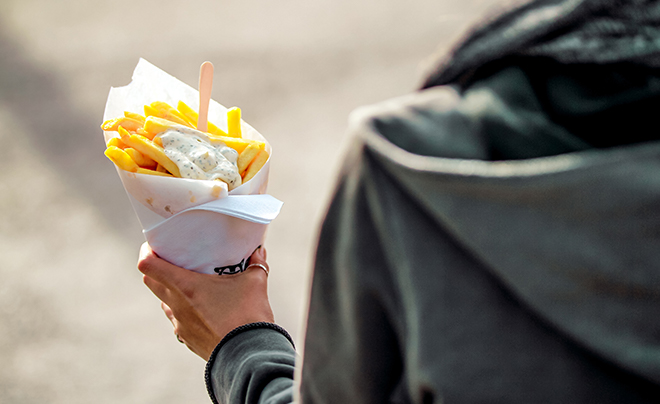Our History:
the story behind the fry fix
Our Authentic Recipes:
made with love


The Fries:
The Fry Fix started making our Belgian-style fries with russet potatoes until one day there was a shortage. A good friend of Serge’s told him about Kennebec potatoes from Maine, which are a cross between two potatoes. They realized these were the best potatoes our there for making fries!
They’re made extra thick (the way you’ll find them in Belgium), and double-fried to golden perfection: soft on the inside and crunchy-crisp on the outside.
The Aioli:
While Belgian people traditionally only eat fries with mayonnaise, Lucia knew that the American audience would want something that packed an extra punch. She created a homemade garlic-based aioli that was perfect as a dipping sauce. Fun fact: The Fry Fix sells 7 gallons of the stuff every week!


The Waffles:
Our waffles recipe is passed down from many generations of Belgian recipes. The technique is very complex because the waffles are made from dough rather than a batter and it takes 4 hours to make a batch. This makes them much denser, sweeter, and overall tastier.
Serge’s brother lives in France and is friends with one of the top pastry chefs in Paris. Fortunately for The Fry Fix (and for us), this chef was kind enough to help Serge refine his recipe and perfect his process – taking their waffles to the next level. They’re truly out of this world.
The Waffles:
Our waffles recipe is passed down from many generations of Belgian recipes. The technique is very complex because the waffles are made from dough rather than a batter and it takes 4 hours to make a batch. This makes them much denser, sweeter, and overall tastier.
Serge’s brother lives in France and is friends with one of the top pastry chefs in Paris. Fortunately for The Fry Fix (and for us), this chef was kind enough to help Serge refine his recipe and perfect his process – taking their waffles to the next level. They’re truly out of this world.
You can experience our classic Belgian waffles covered in Nutella and whipped cream!
it all began in belgium:
the history of fries
While the origin of fries has always been a topic of great debate among fry enthusiasts (many believe they come from France, while others believe they originated in the U.S.), the truth is that fries began in Belgium as Frietkots – fast, easy street food that you could take on-the-go from local street vendors.
The first to discover potatoes were the Spanish in the early 15th century, and 200 years later in the late 17th century, the Belgians introduced the first fried potatoes in the southern part of Belgium (between the two cities of Liège and Dinant). The original idea came from the practice of catching and frying small fish from the Meuse river, but because the river froze during winter time, people began using the same procedure with potatoes instead.
This marked the beginning of what would become a national dish in Belgium and a longstanding (and beloved!) cultural tradition.



